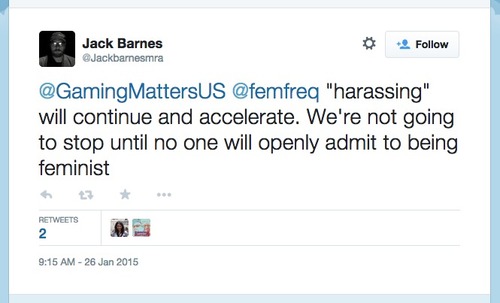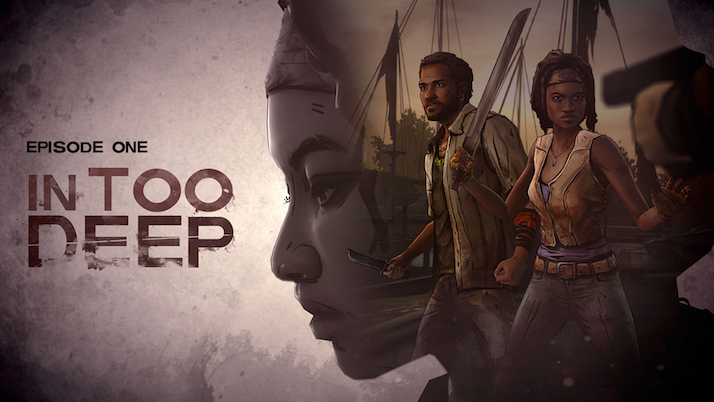I gave my son his first controller when he was six months old, an old Xbox brick that he could pound on while he was sitting in his high chair. The shiny buttons didn’t fascinate him as much as I’d hoped, but like any delighted gamer mama, I snapped photos whenever he picked up the controller, and dreamed of a future playing side-by-side with my little one, just as I’d grown up playing with my dad.
As Jack grew older, he often sat with me while I played. He clocked a lot of lap time during my brief flirtation with World of Warcraft (he called my lady characters by the collective “little man,” as in, “I want the little man!”) and loved to make my avatar jump and move. Another favorite was Beautiful Katamari; his laughter echoed through the house when I rolled up wiggling cows and protesting people. But it was a long time before we found a game he could play on his own.
It wasn’t until we moved across the country and bought him an iPad so we could chat easily with family back home that he found his way. I downloaded a number of kid-friendly titles, games meant to encourage reading and math skills, and he took to them right away. I confess I breathed a small sigh of relief: my son was a gamer at last. Jack, though, wasn’t completely satisfied. He still wanted to be like mama and his stepdad, and play games on the television with the controller.
We’re very careful about what we play in front of him. We have daytime games and nighttime games, and anything that involved violence against realistic-seeming creatures was off-limits. This doesn’t mean we fully shelved games like Mass Effect or the Elder Scrolls series during the day, but we limited our play sessions to running around exploring, or fighting a Skyrim dragon or two. Jack loved to sit next to one of us, holding the extra controller so he could be “the lightning hand” as we fought across Skyrim. But every game he tried on the Xbox was a failure. He was four then, and he still could not master the controller.
Jack has always gotten frustrated easily. Patience is something we’ve had to continually work on. He doesn’t like to fail, and he doesn’t like it when technology fails him, as sometimes happens when we play Kinect or Wii games, for instance, and he’d always had a fairly short attention span in general, which didn’t help. So we would let him try any Xbox game he wanted that fell within our aforementioned rules (or at least had play that could be adapted, like Skyrim), but he couldn’t play anything as well as he wanted, and he would get angry and have a mini-meltdown. It was so hard to watch him want to play, and we were at a loss – everything we’d tried had been a no-go.
Everything changed one night when he climbed out of bed and walked into the living room while my husband and I were playing Left 4 Dead 2. The L4D series is high on my list of all-time favorites, and since it’s one of the few games that offers a really rich same-console co-op experience anymore, we often played together. This was a game firmly in the nighttime category, off-limits to the munchkin, and we’d had to pause it before, and often, when we’d hear his little running feet down the hall. But this time we were embroiled, or he was quiet, and the hall was dark, and he was there in the living room before we noticed. “What’s that?” he asked, totally in awe. “Are those zombies?” Instantly, he was hooked.
Jack had always loved monsters, zombies most of all. Kids pick up on what their parents like, of course, and zombies were our go-to instead of werewolves or vampires or monsters who live under beds and in closets. So seeing all the things he craved, zombies, on a game, and on the elusive Xbox… well, it was a cocktail for obsession. He asked us about the game for days. Weeks. “Let’s play that one game, mommy. With the zombies,” he would wheedle. “Can I see it?” And I confess, reader, I was weak. I caved. I told myself that the graphics were kind of muddy and there wasn’t that much gore, so what the heck. I gave in and loaded up Left 4 Dead 2 as my son settled in on the couch.

Of course, he took to it instantly. He was like an entirely different kid. He struggled with it for a few minutes, looking from the screen to the controller and back, but he was so determined that he played past his initial frustration and then away he went.
Jack has also always loved toy weapons, and that hasn’t been an easy thing to handle. I’ve read so many treatises on kids and fake weapons, but one that really stuck with me came from Heather Shumaker’s It’s Ok Not To Share and Other Rules for Raising Competent and Compassionate Kids. Don’t take the weapons away, Shumaker says. You don’t want to train your kids to think they have to do the things that interest them in secret, especially if what interests them is weapons. Teach them, play with them, and let them know that their interests are important to you… but set guidelines. I think that’s good advice, and it applies to a lot of considerations here. I know my allowing him to play such a violent game is a controversial decision. It’s something I struggled with then, and I’ve continued to question whether or not I did the right thing. There’s no clear path through the challenge of parenting. I can’t bounce onto GameFAQs when I get stuck. When I decided that day to sit down and play L4D2 with him, we took an alternate path, and we’ve had to find our own way.
One thing I wonder is: where should we draw the line on violence in children’s play? A lot of kid-games are naturally violent, and not just those that involve the frequent “bang-bangs!” Should we only be concerned about violence in video games? I’m not convinced. I will say no one but me has, to my knowledge, ever told my son to stop crashing his cars together or derailing his trains. Watching him send a car tumbling off a cliff made from a box makes me a little uncomfortable, I have to say, and I am always the one who will bring him the Hot Wheels ambulance and fire trucks. “Are the people okay?” I’ll ask him. “They should sure be more careful.” It’s become standard now for him to bring in the search and rescue teams when his car-play goes awry, as it so often does, and it pleases me to see he’s thinking now about these things, about how it’s probably bad to drive full speed into a wall. I challenge him to think about similar things when he’s playing Left 4 Dead. “Be careful there,” I’ll tell him. “You want to help keep your teammates safe.” Maybe it’s not the most traditional way of protecting him, but it’s part of the path we’ve found.
I’ve read a lot of the research on violent games and what effect they might have on both adults and children, and there are a number of warring conclusions and gray areas. No one really knows if children become desensitized to violence simply by playing games, though I’m sure it can be a factor, as can television or exposure to anything else. But child-rearing is a holistic experience, and there’s more to Jack than his fascination for Left 4 Dead. We have always played with him, from that first day. That day, I spent time explaining everything that was happening, from strategy to more philosophic considerations (how did the zombies get there? Were they people?), and have set limits both on how long he can play and what he can do. Once he figured out friendly fire was possible on the harder difficulties, he decided it would be fun to shoot his teammates. We had a long talk after that one, about not shooting your friends and the importance of teamwork (and, y’know, not being an asshole). And there are still some games I don’t let him play or watch. Dead Island was a definite nighttime game, for not only the violence but the exploitation-style treatment of characters, as was Dishonored. We’re careful with movies, too, though this past weekend, Jack chose the original Night of the Living Dead for family movie night (he’s been trying this one for months), and I finally allowed him to watch it. Most of it, of course, went over his head, but we spent a lot of time discussing the ending.
I talk to my child, and always have. I know his understanding of the world is limited by both age and experience, but that doesn’t stop me from approaching him with sophisticated concepts and trying to help him engage with everything around him. One night this past April, Jack got out of bed and came into the living room to find me crying, listening to online radio. He came immediately to comfort me, and I explained, in simple terms, that I was concerned for friends in Boston who were in locked-down neighborhoods while the police searched for men who had been involved in a terrible bombing. We talked for a long time, and I let him listen to the police chatter. I hesitated, but thought explaining was better than lying to him. I shield my son… but not, perhaps, as much as some, or as much as some people think I should.
In the end, I can’t know if what I did was the right thing, but I can say this: once Jack found a game that he could play, and play well, he became a different kid. His attention span grew and he was able to focus more. His fine motor skills improved, and he quickly developed a pretty sophisticated (for a then-four-year-old) idea of strategy. There’s also a lot of research, after all, on the benefits of playing games, and I watched those abilities blossom as Jack played his game. It didn’t really matter what game it was; it was that he was focused, thinking, interacting, and it was changing him. It was rather amazing to see.

After several months, he stopped playing Left 4 Dead. He got more into PowerUp Heroes, a Kinect game, and we bought Lego Star Wars. We played the haunting and beautiful Limbo, though I turned off the horrifying deaths. He adores Portal. He plays Haunted Hollow on his iPad, and every Angry Birds incarnation he can find. Recently, though, his love of all things zombie brought him back to Left 4 Dead, and at age five, we’ve allowed him to watch (but not play) State of Decay a little. His fascination with the games has spread all over the house, and even when he wasn’t playing the video game Left 4 Dead, his own version dominated some of his play hours, when I’d frequently hear him yell, “I need some help over here!” in his best Coach voice (it almost made me want to let him watch the Walking Dead, since Coach’s voice actor showed up as Tyrese, but that one’s firmly off limits). “C’mon, mommy,” he’ll say to me. “Get to the safe room!” And then he’ll blast the hell out of the nearest wall with a toy rifle, or wrestle his giant stuffed reindeer (who makes a great zombie stand-in). We bought him a plush tank from the Left 4 Dead store, too, and I think its giant purple body and ridiculous face has helped keep the game firmly in play-land and not real-world areas.
As for whether or not Jack is desensitized in some way from his exposure to Left 4 Dead and zombies in general, I don’t know. I can say that he’s a sweet, caring child. Recently, he lost a pet goldfish, and he was so torn up that he could only lie on his bed and cry for hours. We buried Mr. Fishy around the side of the house, and we talked about decomposition and how his fish would help feed the earth. He checks frequently on the gravesite, reporting back with excitement on every new bit of flora in the area. The other day, when we were cleaning up after Independence Day fireworks, he took the water I’d laid out for emergencies. “I’m going to pour it on the fishy,” he said. “He might want some water.”
He’s a good kid, this one. And, hey, come the apocalypse, he’ll never argue about the importance of boarding up the windows and stockpiling supplies.





16 thoughts on “Zombie Genocidest: How my preschooler became a Left 4 Dead pro”
Excellent post. As a father of two, I thank you for sharing your own reflections on gaming with your children.
Thinking about Jack’s trepidation with the controller, I recalled how my boys seemed to favor mouse and keyboard controls over gaming controllers. This might be because of my own preferences but it will be interesting to see how this plays out.
There have been times, admittedly, where I’ve allowed our boys to play a game before they were ready. Half Life 2 gave my oldest nightmares of spiders for weeks afterwards. After a few rounds of Tekken 2 on the original PS, my youngest was prone to knocking his big brother around.
These occasions aside, it’s hysterical to watch them parkour around the house after a little Mirror’s Edge. Although I get wearied by their Minecraft obsessions at times, I love the creativity it promotes. Most interestingly, this particular game has prompted them to seek out other Minecraft builders and resources online to further their own creations! I wish most adults would demonstrate such research prowess (“LMGTFY”)!
Most impressively, however, is that my boys know to come to me if anything objectionable comes up. If it’s something my wife and I feel is innocent (there was a nude statue in the background of one title) we talk about a bit and help them understand what “that” means. If it’s too violent or demeaning, they know that demonstrating personal responsibility will be rewarded with another title download.
Recently, my oldest (spider nightmares) asked to play Half Life 2 again and he offered the stipulation that, if it became too intense, he would turn it off. Considering he polished of Bioshock: Infinite without wincing or pretending to skyhook his brother, I think he’ll be okay.
Thanks again!
Oh! My son has attempted the Half Life eps on the Portal disc a little. He can’t resist trying, but he has a hard time with it. We help with that one, but he hasn’t done much with it.
Funny that you prefer keyboard and mouse and that was easier for them. I definitely prefer console/controllers myself, but I think that just feels natural to me because I’ve done more of it.
As for your sons coming to you when they encounter something objectionable, I think that’s great. That’s what I’m shooting for here. I want Jack to feel comfortable talking about everything, and to know that I’ll be here for him, supporting his interests and his questions.
Ok, so everyone knows that I am a huge proponent of age appropriate games. That being said I can see your point…to an extent. I am not one to tell other people how to raise their children (at least to their faces) so I can only talk about this in terms of my own child.
We are not too far away from each other in terms of rationale. I want Pea to be able to explore all of the things that interest her, but it is also my job to protect her from things that can be harmful. It is for that reason that she didn’t have her first weapon until she was a hair shy of 5 and then it was a sword that she used only for cutting down imaginary jungle foliage (and for whacking Lisa that one time, but…) and NEVER guns. I have seen and lost too many folks to gun violence to allow her to play with guns.
Pea doesn’t like death so we don’t play games that deal with death (or I narratively edit it out). We break the Lego bad guys (violent, yes) but we see the heroes rebuild and fight on with no loss of blood, the heartbroken and bad animals in Ni No Kuni don’t die but go to a better place and if they are narratively important enough come back at the end (ok, so I flat out lied to her about what happened to the mother at the beginning), and Animal Crossing and Mario games are just that…Animal Crossing and the Mario games.
It’s the same reason that I haven’t allowed Pea to watch Disney movies…I find the messages damaging. I have also told her that when I think that she is old enough to talk about why I think the princesses make bad choices and have her be able to engage rather than just smile and nod that we will watch the movies together. She is getting there, but says that she doesn’t want to watch them. But, she’s not much on movies. They are too long and she still asks to leave a theater half way through a movie.
What I guess I’m saying in the end is that folks are free to make their own choices about their kids…even if they’re wrong
And I’m kidding about the wrong part, of course.
I think it’s fantastic the level of interaction both of you have with your kids, I had to many friends growing up that had parents that wanted them to stay out of there hair all the time. So kudos.
Well, our kids are really awesome!
Oh, you.
I wonder if some of our choices don’t come from our being in different situations. As I understand it, you all are pretty well in control of raising Pea, as in you have firm, final say in everything. I’ve never really had that. Before we moved, Jack spent a lot of time with other family members while I was in class, and people would give him things, tell him things, let him watch things (someone let him watch train derailment videos–actual, horrifying tragedy here!). People have been giving him weapons they see as innocent since he was a baby. What’s the difference between a toy light saber or a water gun and a zombie game, really? It’s all entertainment; it’s the way we treat it and interact with it that changes. I decided early on to just roll with it instead of trying to control every aspect of our interaction with family, which rarely works from what I’ve witnessed. Of course, once his father and I split up, things got even more complicated. Trying to be really open with him has seemed the best course in our situation. I’m not saying what I’ve done here is best for everyone, but I think it’s been good for us. In a different situation? I might have been different. Who knows. But I’m glad we can talk about it.
I didn’t give light sabers or water guns either. I mean NO weapons of any kind. Not even slingshots or arrows. I was a real hard ass about that stuff. Hell, I returned Barbie/Disney gifts for non- Barbie/Disney versions of the same toys before she even saw them. So you may be right about the amount of control that we had over what we are exposed to.
That being said, I know you and I know Jack. He’s a great kid and you are one hell of a mom. Zombies aside….j/k, but I couldn’t let that chance slip by!
Zombies aside….j/k, but I couldn’t let that chance slip by!
Well, thanks. I think we have a couple of great kids on our hands.
I think we have a couple of great kids on our hands.
I think I will take the risk angering people/Pickle if she gets gifted with Disney Princess nonsense unless, somehow, SHE discovers it and wants it. But this time I also knew enough to say NO in advance. I didn’t know anything about kids when Jack was born! We’re probably lucky we all survived, much less turned out okay.
I think that’s awesome! I’m lucky enough to have a mother who always talked to me about everything and got me to think no matter what the subject. While kids may not have all the understanding they’re not stupid by any means and pick up allot of things even when we try to keep that stuff away from them, so from being the child, point of view, I’m happy my mom didn’t shy away from talking about stuff. Made it easier to come to her with things when I got older too. Your kid is very lucky.
That’s what I want for his future. I mean, I say that now. The first time he comes at me with a relationship problem I might run and hide my head in the sand.
That’s what I want for my future with Pea too. That’s why we have the “you never get in trouble if you tell the truth” rule. The rule is that we might do some things differently but there is no trouble for being honest with me about what she has done. Good lord, I hope that I can stick to that one!
I completely disagree with letting a preschooling play video games meant for adults. I think you need some help with your parenting.
Interesting! Any facts/reasons to back that up?
Probably not any interaction with my actual child, because he’s a pretty great kid. And it can’t be the studies that back it up, because there’s no conclusive evidence that indicates violent games have a negative effect longterm effect on anyone, regardless of age, and cooperative gaming, per the research I was reading this week, mitigates the in-the-moment increase in aggression.
So I’m guessing it comes down to one of two things: either this poster thinks that no adult-oriented media is appropriate for children, which is a position I can understand, but it’s a child-by-child approach, I think, or the second, which is that this poster thinks it’s a problem with video games in particular, which I will have to counter with the question: why are violent video games so bad, when children’s shows and games are often equally violent?